Why fewer tax returns have been filed so far this year
The IRS notes a sharp decline in tax returns filed in the first half of this year’s filing season.
A report issued by the Treasury Inspector General for Tax Administration provided the interim results, confirming that through March 3, the IRS has received 61.06 million tax returns -- about 5.1 million fewer than received over the same period last year. That’s a decline of about 8.5 percent.
The Department of Treasury issued about 49.5 million refunds, or about 4.1 million less than this time last year. The average refund so far this year is $3,016, up slightly from last year’s $2,993.
Much of the drop in filings has been attributed to delays in processing refunds for those claiming the Earned Income Tax Credit and the additional Child Tax Credit. A law passed in 2015 gave the IRS extra time to check for signs of tax fraud and identity theft, which was a specific concern with tax returns that included claims for these tax credits.
Before the start of the tax season, the IRS announced it would delay refunds for filers who claimed these credits until Feb. 15. That prompted many of these taxpayers to wait until after that date to file.
Another reason cited for the drop is the penalty mandated by the Affordable Care Act for filers who fail to prove they were covered by qualifying health insurance in 2016. The penalty for lacking coverage can be as much as $695 per person for the 2016 tax year.
Many individuals don’t provide the supporting Form 1095-B to their tax preparers, either because they didn’t get the form or aren’t aware they should give it to their tax pro. Tax preparers who don’t like to file tax returns with incomplete information are waiting to file their clients’ returns until these forms are in hand.
Some taxpayers may also have delayed filing because they expected revisions to the tax code. One such expectation was the repeal of the Affordable Care Act and its associated additional taxes and penalties. The House of Representative’s failure to do so should have stopped this expectation in its tracks. And regardless of the talk about other meaningful tax law changes, the chances of anything happening before April 18 and being retroactive to 2016 is zero.
Finally, some speculation has it that many immigrants have put off filing because of worries about facing new scrutiny. No evidence shows the IRS selects immigrants’ tax return for additional review, but with deportation fears so high, some may be concerned nevertheless even though paying taxes is a legal requirement.




